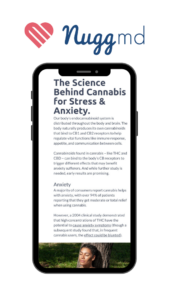Approximately 6.8 million people have general anxiety disorder and 21 million experience depressive episodes. Treatment for these conditions is unique to the individual but typically entails some form of talk therapy and, when appropriate, medications like Lexapro.
There’s a lot we don’t know about how Lexapro and cannabis interact. Both substances affect the brain, and it is important to consult with your doctor before adding either to your existing treatment regimen.

Find natural, lasting relief with our comprehensive (and completely free) patient’s guide to medical cannabis for stress and anxiety.
What is Lexapro?
Lexapro is also called Cipralex or Escitalopram. It is an SSRI medication that raises serotonin levels in the brain by hindering serotonin reuptake of the neurotransmitter into the presynaptic nerve ending.2 This medication is typically prescribed to treat mental health conditions like anxiety or depression and comes in pill or liquid form.
Combining Cannabis and Lexapro: What the Latest Research Says

Some patients report using cannabis to manage symptoms of anxiety or depression, though research remains limited, and effects can vary widely.3 The plant has hundreds of chemical compounds that have been studied for their potential therapeutic effects. Some early research suggests that cannabinoids like THC and CBD may influence anxiety-related responses, though results are mixed.
Due to its ability to alter the mind and body, it’s important to be mindful when mixing cannabis with other medications like SSRIs.
There are minimal studies examining how Lexapro and weed interact when taken together. However, it is generally recommended to not take the two simultaneously.
One study found that combining CBD and SSRIs increases the risk of adverse side effects, including cough, diarrhea, fatigue, and dizziness.4
Some researchers have explored whether cannabinoids affect serotonin signaling. However, its ability to do so isn't yet understood. Combining cannabis with medications that influence serotonin, like SSRIs, could increase the risk of adverse effects.5
The increase in serotonin from THC, especially when taken in combination with medications like Lexapro, can result in adverse side effects like serotonin syndrome. This condition can lead to symptoms such as confusion, rapid heart rate, high blood pressure, or agitation. In severe cases, it may require immediate medical attention.

Find natural, lasting relief with our comprehensive (and completely free) patient’s guide to medical cannabis for stress and anxiety.
Are You Considering Using Cannabis and Lexapro?
Combining cannabis with any substance or medication carries its own risks. Cannabis research is still in its earliest stages, and there is a lot that researchers still don't know. That leaves the door open for unexpected interactions with other substances. If you are considering combining cannabis with any other substance or medication, speak to your doctor for proper medical guidance.
Likewise, stopping the use of a prescribed medication can lead to unintended consequences. Many medications take time to build up in the body. Stopping suddenly can cause unpleasant and potentially serious or even fatal side effects. If you'd like to stop using or replace a medication, you need to follow the guidance of your medical provider to make any approved adjustments safely.
References
1. Keyhani, Salomeh, et al. “Risks and Benefits of Marijuana Use.” Annals of Internal Medicine, vol. 169, no. 5, 24 July 2018, p. 282, www.ncbi.nlm.nih.gov/pmc/articles/PMC6157909/, https://doi.org/10.7326/m18-0810.
2. Culpepper, Larry. “Escitalopram.” The Primary Care Companion to the Journal of Clinical Psychiatry, vol. 04, no. 06, 1 Dec. 2002, pp. 209–214, https://doi.org/10.4088/pcc.v04n0601.
3. Kosiba, Jesse D., et al. “Patient-Reported Use of Medical Cannabis for Pain, Anxiety, and Depression Symptoms: Systematic Review and Meta-Analysis.” Social Science & Medicine, vol. 233, July 2019, pp. 181–192, https://doi.org/10.1016/j.socscimed.2019.06.005. Accessed 20 Oct. 2019.
4. Vaughn, Samuel, et al. “The Impact of Marijuana on Antidepressant Treatment in Adolescents: Clinical and Pharmacologic Considerations.” Journal of Personalized Medicine, vol. 11, no. 7, 29 June 2021, p. 615, https://doi.org/10.3390/jpm11070615.
5. Baltz, Jacob, and Lamanh Le. “Serotonin Syndrome versus Cannabis Toxicity in the Emergency Department.” Clinical Practice and Cases in Emergency Medicine, vol. 4, no. 2, 2 Mar. 2020, pp. 171–173, https://doi.org/10.5811/cpcem.2020.1.45410. Accessed 25 July 2020.
6. Buckley, Megan C., et al. “Inflammatory Bowel Disease and Cannabis: A Practical Approach for Clinicians.” Advances in Therapy, 10 June 2021, https://doi.org/10.1007/s12325-021-01805-8. Accessed 4 Mar. 2022.
7. Vaillancourt, Régis, et al. “Cannabis Use in Patients with Insomnia and Sleep Disorders: Retrospective Chart Review.” Canadian Pharmacists Journal / Revue Des Pharmaciens Du Canada, vol. 155, no. 3, 15 Apr. 2022, pp. 175–180, https://doi.org/10.1177/17151635221089617.
8. Gruber, Amanda J., et al. “Do Patients Use Marijuana as an Antidepressant?” Depression, vol. 4, no. 2, 1996, pp. 77–80, https://doi.org/10.1002/(sici)1522-7162(1996)4:2%3C77::aid-depr7%3E3.0.co;2-c. Accessed 4 Oct. 2019.
9. Feingold, Daniel, and Aviv Weinstein. “Cannabis and Depression.” Cannabinoids and Neuropsychiatric Disorders, 18 Dec. 2020, pp. 67–80, https://doi.org/10.1007/978-3-030-57369-0_5.
10. Wright, Madison, et al. “Use of Cannabidiol for the Treatment of Anxiety: A Short Synthesis of Pre-Clinical and Clinical Evidence.” Cannabis and Cannabinoid Research, vol. 5, no. 3, 3 Jan. 2020, https://doi.org/10.1089/can.2019.0052.
11. Blessing, Esther M., et al. “Cannabidiol as a Potential Treatment for Anxiety Disorders.” Neurotherapeutics, vol. 12, no. 4, 4 Sept. 2015, pp. 825–836, link.springer.com/article/10.1007%2Fs13311-015-0387-1, https://doi.org/10.1007/s13311-015-0387-1.
The information in this article and any included images or charts are for educational purposes only. This information is neither a substitute for, nor does it replace, professional legal advice or medical advice, diagnosis, or treatment. If you have any concerns or questions about laws, regulations, or your health, you should always consult with an attorney, physician or other licensed professional.




